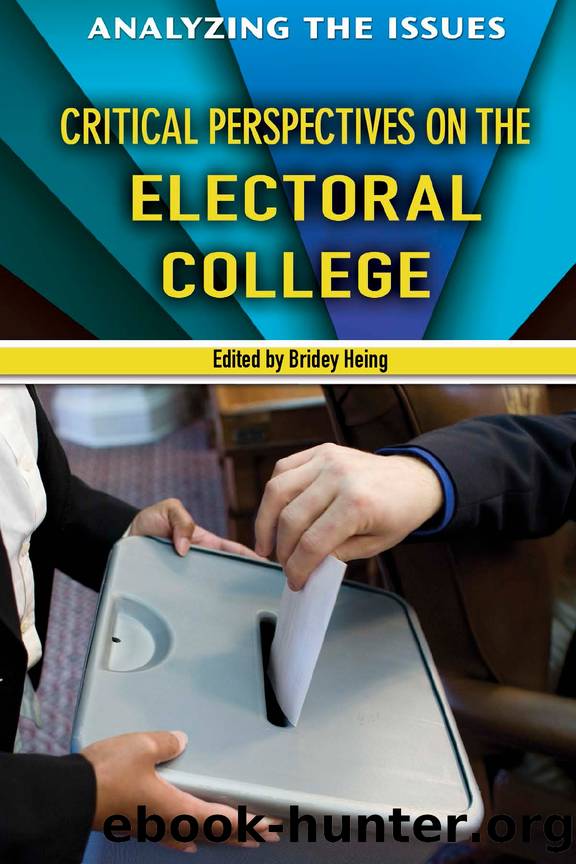Critical Perspectives on the Electoral College by Bridey Heing

Author:Bridey Heing
Language: eng
Format: epub
Publisher: Enslow Publishing, LLC
Published: 2019-08-27T00:00:00+00:00
2. What was the basis for this case? Why did the plaintiff feel it was unconstitutional and did the court agree?
EXCERPT FROM RAY, CHAIRMAN OF THE STATE DEMOCRATIC EXECUTIVE COMMITTEE OF ALABAMA V. BLAIR, FROM THE US SUPREME COURT, APRIL 15, 1952
Where a state authorizes a political party to choose its nominees for Presidential Electors in a state-controlled party primary election and to fix the qualifications for the candidates, it is not violative of the Federal Constitution for the party to require the candidates for the office of Presidential Elector to take a pledge to support the nominees of the partyâs National Convention for President and Vice-President or for the partyâs officers to refuse to certify as a candidate for Presidential Elector a person otherwise qualified who refuses to take such a pledge. Pp. 343 U. S. 215-231.
1. Presidential Electors exercise a federal function in balloting for President and Vice-President, but they are not federal officers. They act by authority of the state, which, in turn, receives its authority from the Federal Constitution. Pp. 343 U. S. 224-225.
2. Exclusion of a candidate in a party primary by a state or political party because such candidate will not pledge to support the partyâs nominees is a method of securing party candidates in the general election who are pledged to the philosophy and leadership of that party, and it is an exercise of the stateâs right under Art. II, § 1, to appoint electors in such manner as it may choose. United States v. Classic, 313 U. S. 299, and Smith v. Allwright, 321 U. S. 649, distinguished. Pp. 343 U. S. 225-227.
3. The Twelfth Amendment does not bar a political party from requiring of a candidate for Presidential Elector in its primary a pledge to support the nominees of its National Convention. Pp. 343 U. S. 228-231.
4. The requirement of such a pledge does not deny equal protection or due process under the Fourteenth Amendment. Nixon v. Herndon, 273 U. S. 536, distinguished. P. 226, n 14.
257 Ala.___, 57 So.2d 395, reversed.
The Alabama Supreme Court upheld, on federal constitutional grounds, a peremptory writ of mandamus requiring petitioner, the Chairman of the State Executive Committee of the Democratic Party, to certify respondent as a candidate for Presidential Elector in a Democratic Primary which was to be held on May 6, 1952. 257 Ala.___, 57 So.2d 395. This Court granted certiorari. 343 U.S. 901. In a per curiam decision announced on April 3, 1952, in advance of the preparation of this opinion, this Court reversed that judgment. 343 U. S. 154. This opinion states the reasons for that decision.
1. According to this case, what requirements are placed on political parties as they choose electors?
Download
This site does not store any files on its server. We only index and link to content provided by other sites. Please contact the content providers to delete copyright contents if any and email us, we'll remove relevant links or contents immediately.
Harry Potter: A Journey Through a History of Magic by British Library(396)
The Science of Philip Pullman's His Dark Materials by Mary Gribbin(377)
The Basics of Organic Chemistry by Clowes Martin;(364)
Harry Potter and the Sorcerer's Stone: SparkNotes Literature Guide by SparkNotes(341)
Braiding Sweetgrass for Young Adults by Robin Wall Kimmerer(316)
Flowers in the Gutter by K. R. Gaddy(301)
Summary of the Selfish Gene by Readtrepreneur Publishing(298)
Super Simple Chemistry by D.K. Publishing(295)
JavaScript Coding for Teens: A Beginner's Guide to Developing Websites and Games by Yueh Andrew(289)
Exam Success in Geography for IGCSE & O Level by Unknown(285)
Analysis and Linear Algebra for Finance: Part II by Bookboon.com(271)
Dark days in Salem: the witchcraft trials by Deborah Kent(269)
The Python Audio Cookbook;Recipes for Audio Scripting with Python by Alexandros Drymonitis(265)
Key Immigration Laws by Kathryn Ohnaka(263)
Solutions for a Cleaner, Greener Planet: Environmental Chemistry by Marc Zimmer(254)
Cracking the AP Economics Macro & Micro Exams, 2017 Edition by Princeton Review(253)
The Science of Fashion by Julie Danneberg;(240)
Reverse Engineering For Everyone! by mytechnotalent(237)
Cracking the AP Psychology Exam, 2017 Edition by Princeton Review(229)
